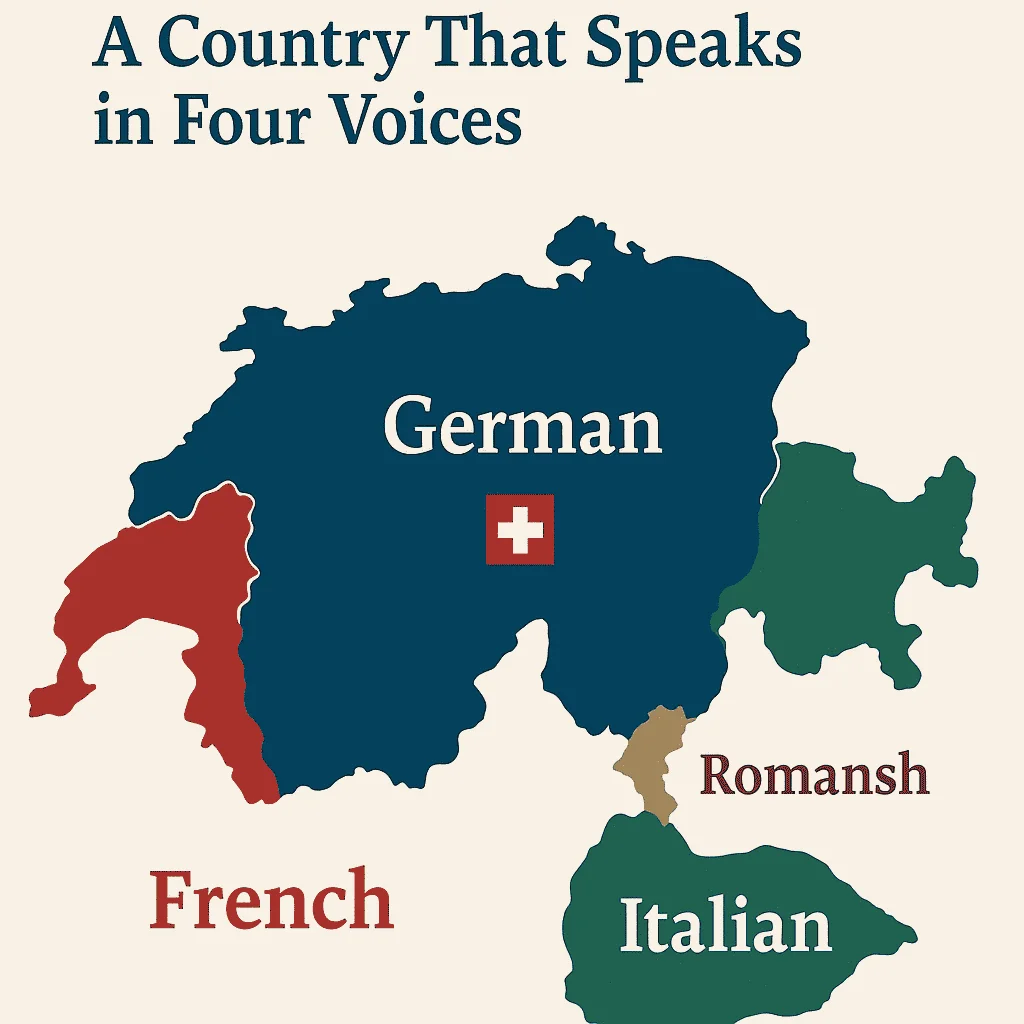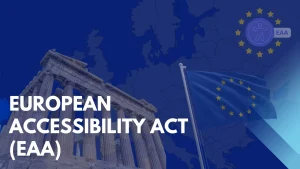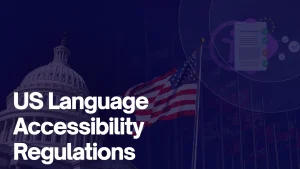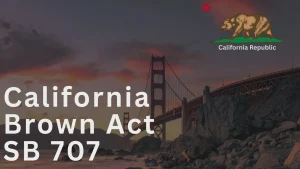We all know Switzerland for its chocolate, watches, and the stunning Alps—that peaceful, neutral country that somehow stays out of wars. But here’s something even more fascinating: Switzerland has four official languages! Imagine living in a place where your neighbor might speak a completely different language—not just a dialect, but an entirely distinct tongue. Sounds unreal, right? Yet in Switzerland, that’s just everyday life.
From German and French to Italian and Romansh, the Languages Spoken in Switzerland reflect its rich cultural mosaic. Whether in business, education, or casual chats, multilingualism is woven into the Swiss way of life. So next time you think of Switzerland, remember: it’s not just about the scenery—it’s a linguistic wonder too!
Where most countries stick to one or two languages, Switzerland went full multilingual mode. It officially recognizes German, French, Italian, and Romansh. And beyond that, thanks to its international connections and diverse population, there are plenty more languages spoken across the country.
Let’s take a closer look at how these languages coexist and why it makes Switzerland so unique.
The Four Official Languages
In most places, being bilingual is impressive. In Switzerland, it’s practically normal. Depending on where you live, you could be greeted in any of the four main languages.
1. Swiss German (65%) – The Language Even Germans Find Confusing
Yep, German is the most widely spoken language in Switzerland, but not the kind you’d learn in school. This is Schweizerdeutsch, or Swiss German, and it’s a whole different beast.
It’s basically a collection of dialects that vary from town to town, sometimes even from valley to valley. So much so that people from Germany often need subtitles when watching Swiss TV shows. No joke.
One quirky thing? There’s no official written form for Swiss German. For formal stuff like school or government documents, people use High German. But in daily life, everyone just speaks their local dialect, which can get confusing if you’re new.
Want to impress someone? Try saying “Chuchichäschtli” (kitchen cupboard). Try saying that five times fast… I dare you! Even people who’ve lived there their whole lives sometimes stumble over it.
2. French (23%) – Where France Meets the Alps
Go west in Switzerland and boom, you’re basically in France, minus the Eiffel Tower and Parisian attitude.
Geneva, Lausanne, Montreux… these places just feel different. You’ll see more croissants than you can eat, more cheese than you can taste, and honestly?
Swiss French is almost the same as the French spoken in France, with a few differences, like how they say septante instead of soixante-dix for 70. And if you’re used to standard French, that might throw you off at first.
Honestly, though, if you know French, you will be just fine. Just don’t be surprised when someone says huitante instead of quatre-vingts for 80 and you suddenly feel confused. I did, and I had to Google it later, like “Wait, was that a typo?”
It’s not a big difference, but once you notice it, you can’t unhear it.
3. Italian (8%) – When the Alps Feel Mediterranean
Head south into Ticino and boom, it’s like someone pressed a button and suddenly you’re in Italy. Sun, pasta, espresso, friendly people saying ciao like it’s going out of style… yeah, it feels like Milan or Rome, except with mountains basically right outside your window.
Swiss Italian is almost exactly like standard Italian. If you are fluent, you probably would not notice the difference unless someone pointed it out. There are a few tiny things here and there, for example, how they sometimes mix in words from German or French because, well, Switzerland.
I once heard someone say “ho fame,” but then followed it up with something that sounded like “aber ich gehe später ins Café.” Wait, what language was that?!
So yeah, it’s mostly Italian, but with a Swiss twist. And honestly, I can’t complain, where else do you get tiramisu with a view of the Alps?
4. Romansh (0.5%) – The Underdog of Languages
Okay, now we come to the rarest one: Romansh. If you’ve never heard of it before, don’t worry, you’re not alone.
It’s spoken mainly in Graubünden, which is this cool mountainous region in eastern Switzerland. And guess what? It’s actually a Romance language, meaning it comes straight from Latin, like Italian or French.
Only about half a percent of Swiss people speak it. So yeah, we’re talking less than 1%. That’s like… barely anyone. But somehow, it’s still around today.
Back in 1938, the Swiss government decided to make it an official language, probably to stop it from disappearing completely. And honestly, it worked kind of well. These days, you’ll see it used in local media, schools, and even some government stuff. There are TV shows and radio stations in Romansh!
It looks like a quiet little secret that most people do not know about, but those who do love it. Kind of like finding a hidden track on your favorite album. No big fanfare, but super cool once you discover it.
What About English and Other Languages?
If you’re visiting Switzerland and only speak English, don’t panic. You will be fine.
Especially in big cities like Zurich, Geneva, or Basel, most people speak at least some English. And I mean at least some, like, enough to get by without too much trouble.
Switzerland has such a strong international presence with all the global organizations based there (think UN, WTO, WHO), plus top universities and banking hubs, so yeah… English is kind of everywhere.
Honestly, sometimes it feels like everyone under 30 just defaults to English anyway. Especially when hanging out with friends or texting.
And then there’s immigration. Over the years, lots of people from Portugal, Serbia, Croatia, Albania, and other countries have moved to Switzerland. So now, you’ll hear Portuguese spoken in shops, or catch snippets of Serbian on the train.
It adds another layer to the whole language mix. Like, sure, they’ve got four official languages, but there’s a ton more floating around daily life.
How Do People Deal With All These Languages?
Honestly? It works way better than you’d expect. I mean, on paper, it sounds kind of chaotic, four official languages in one small country? That seems complicated, right?
But somehow… it just works.
How?
Well, let’s break it down, not too neatly.
Schools:
Swiss kids start learning multiple languages really early. Like, elementary school early. Depending on where they grow up, they’ll learn their local language first, then add at least one more. So a kid from Geneva might learn French and German, while someone from Ticino could be juggling Italian and maybe French or German too. Sounds intense? Maybe. But hey, they get used to it.
Government:
Everything official has to be translated into all four languages. All of it. Even stuff like tax forms, legal documents, and government websites. Imagine having to translate every single thing three extra times just to make sure everyone understands it in their own language. That’s Switzerland for you.
Media:
Same deal. If there’s a big news story or a public service announcement, you’ll see it in French, German, Italian, and sometimes even Romansh. TV news literally has different versions for each language group. Which is wild when you think about it, it’s like having four separate national broadcasters in one country.
Daily Life:
When in doubt, most people just default to English. Especially the younger crowd, they basically grew up with it. Whether it’s through YouTube, Netflix, video games, or chatting with friends online, English is just… everywhere.
So yeah, sometimes it’s just easier to switch to English than to try to figure out which official language to use. And honestly? No one judges you for it.
Now, if I told you a country had four official languages and everyone somehow made it work, you’d probably think I was exaggerating or making it up. Like, how does that even function?
But it does, somehow. It’s messy when you break it down, but in real life, it just kind of flows. People adapt. They code-switch. They laugh about it. And they get stuff done.
That’s probably why Switzerland ends up being such a popular place for international companies and global organizations. They’re already used to working across languages and cultures. It’s not something they have to learn; it’s just normal life.
Why This Matters for Businesses & Travelers
If you’re planning to do business in Switzerland, here’s a heads-up: you can’t just use the same message everywhere and expect it to work.
Okay, so imagine this: you make an ad that absolutely crushes it in Zurich. People love it. It’s funny, clever, hits all the right notes. Then you roll it out in Geneva or Lugano… and crickets. Or worse—people just kind of stare at it like “Uh… what?”
Why? Because Zurich speaks Swiss German, Geneva’s all French, and Lugano? That’s Italian territory. So yeah, same country, totally different vibes.
It’s not enough to just translate your message word-for-word. You’ve got to get the tone right. The slang. The cultural stuff people don’t even realize they’re reacting to. Like, if you say something slightly off in Swiss German, locals will feel it—even if they can’t explain why.
And trust me, if your marketing sounds robotic or forced in someone’s native language, they’ll pick up on it fast. Like, “this was clearly written by someone who Googled our language” fast.
That’s where a service like TransLinguist’s localization services comes in handy. Think of us as your behind-the-scenes crew making sure your website, contracts, presentations—whatever it is—actually sound like they were made by someone who gets the local scene.
Because honestly? It’s not just about being understood. It’s about sounding like you belong.
And in a place like Switzerland, where language runs deep, that kind of detail can make or break how your brand is seen.
Final Thoughts: Switzerland, A Linguistic Wonderland
Let’s be real, juggling four official languages in one country sounds like a headache waiting to happen. But somehow, Switzerland makes it work.
Let’s be honest, Switzerland’s whole language thing sounds like it was dreamed up by someone who thought, “Hey, what if we made things extra complicated?” But somehow… it just works.
You’ve got Swiss German dialects that even Germans don’t understand, like some weird linguistic inside joke. Then there’s Romansh, which is basically the quiet kid in the corner who’s been around forever but doesn’t say much. Somehow, though, it’s still holding on. Respect.
In Switzerland, language isn’t just something you speak; it’s part of your identity. You live it, breathe it, and yeah, sometimes trip over it.
If you’re a tourist? Good luck ordering fondue without accidentally insulting the cheese. If you’re a business? Hope your website doesn’t sound like it was translated by a bot, because people will notice. Especially in Zurich.
Because here’s the thing: words aren’t just tools. In a place like Switzerland, they shape how people see you and whether you belong or not. A lot.
So yeah, if you want your brand to actually connect with people across all those cantons (and not just sound like a poorly translated brochure), you’ve got to get the language part right.
That’s where TransLinguist comes in. Think of us as your cheat code for sounding local, no matter which language corner of Switzerland you’re aiming for. Check out TransLinguist’s expert translation and localization services. Because when it comes to communication, getting it right isn’t just nice-to-have, it’s kind of everything.
FAQs:
What are the 4 languages spoken in Switzerland?
There are four official national languages of Switzerland: German, French, Italian, and Romansh. Being able to speak more than one language is a big part of what it means to be Swiss, and the law protects this.
Which language is spoken in Genève, Switzerland?
The three main languages spoken in Geneva are French, Italian, and German. French is the main language spoken in Geneva, but most residents will also speak a second language.
What kind of language is Romansh?
Romansh (/roʊˈmaenʃ, roʊˈmɑːnʃ/ roh-MA(H)NSH; sometimes also spelled Romansch and Rumantsch) is a Romance language of the Gallo-Romance and/or Rhaeto-Romance branch of languages spoken largely in the Swiss canton of the Grisons (Graubünden).
Which country has 4 official languages?
Singapore is not the only country with four official languages. Other countries with four official languages are Rwanda, Papua New Guinea, Luxembourg, Switzerland, and Spain. However, this is the most intriguing one. This scenario is especially remarkable since all four of Singapore's official languages come from separate language families.



